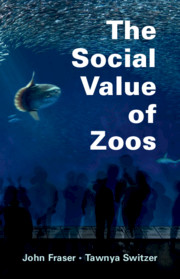Book contents
- The Social Value of Zoos
- The Social Value of Zoos
- Copyright page
- Contents
- Figures
- Tables
- Preface
- Acknowledgments
- Chapter 1 Context
- Chapter 2 Ontology
- Chapter 3 Learning
- Chapter 4 Morality
- Chapter 5 Pleasure
- Chapter 6 Meaning
- Chapter 7 Bonding
- Chapter 8 Connectedness
- Chapter 9 Identity
- Chapter 10 Activation
- Chapter 11 Impact
- Chapter 12 Integration
- References
- Index
Chapter 4 - Morality
Zoos As Moral Actors
Published online by Cambridge University Press: 26 March 2021
- The Social Value of Zoos
- The Social Value of Zoos
- Copyright page
- Contents
- Figures
- Tables
- Preface
- Acknowledgments
- Chapter 1 Context
- Chapter 2 Ontology
- Chapter 3 Learning
- Chapter 4 Morality
- Chapter 5 Pleasure
- Chapter 6 Meaning
- Chapter 7 Bonding
- Chapter 8 Connectedness
- Chapter 9 Identity
- Chapter 10 Activation
- Chapter 11 Impact
- Chapter 12 Integration
- References
- Index
Summary
While rumblings about zoos as chaotic incarceration have persisted since the London Zoo was first made accessible to the general public, sustained challenges regarding the rights and inherent responsibilities of zoos as moral actors have been a persistent feature of zoo operations for the past fifty years. Given that several decades of social science research on larger social narratives of zoos as symbols, destinations, and public voices with authority in civil discourse can now be drawn from, we begin this chapter with an overview of the context, understandings, and assumptions that seem to ground common zoo narratives. To highlight how metaphoric and moral critiques challenge the legitimacy of zoos as moral actors and leaders in the environmental movement, as well as some counterpoints and questions that suggest the opposite, we also take a closer look at how philosophers, public audiences, zoo and animal behavior professionals, and critics perceive, present, value, and contest the civic role of zoos in contemporary society. While we do not see rhetorical and philosophical challenges to legitimacy as obstacles that necessarily prevent zoos from becoming optimally effective sites and tools for learning and associated mission outcomes, we do believe critical narratives help ground thinking about both the good and the bad that flows from the display of animals. We thus deconstruct some of the common social narratives about zoos; make a case for why zoos’ care for animals within and beyond zoo settings should be understood as an important dimension of learning and embraced as a unique opportunity to advance an urgent conservation agenda; and introduce research that begins to firmly upend the critique that zoos are not legitimate educational venues.
- Type
- Chapter
- Information
- The Social Value of Zoos , pp. 44 - 62Publisher: Cambridge University PressPrint publication year: 2021

